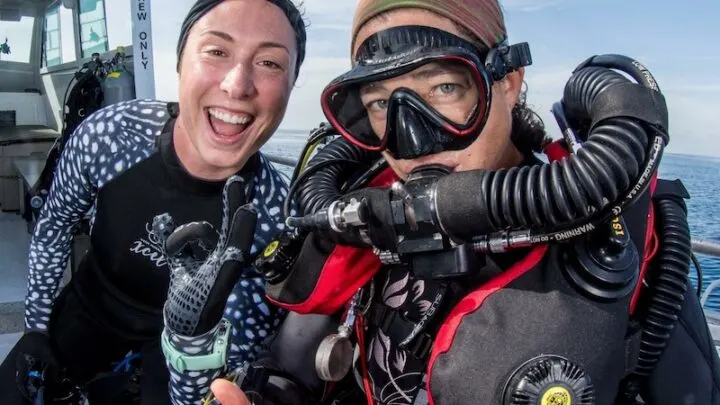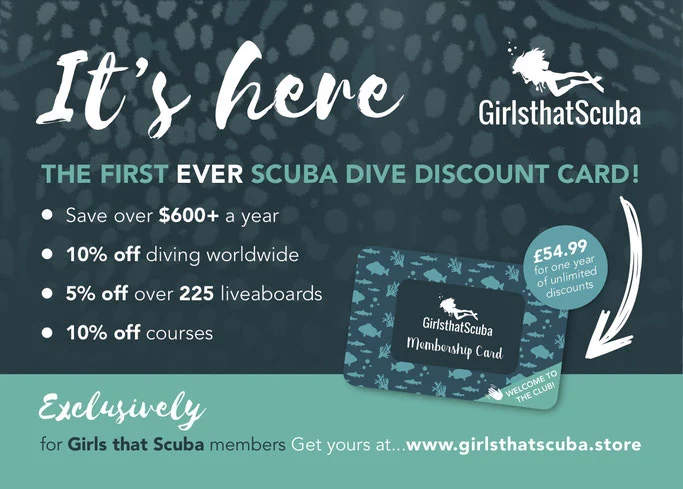On your entry-level scuba diving course you will have learned how to dive alongside a buddy, and your instructor will likely have stressed the importance of the buddy system to make your dives safer and more fun. But being a great buddy doesn’t come instantly – we’re here to help you become the best buddy you can possibly be!
Read on to discover why the buddy system is so important, what it takes to be a great scuba diving buddy, and what to do if you find yourself travelling solo and needing to get to know a new buddy.
Why is the buddy system so important?
We all start somewhere with our dive journey, and with the exception of technical divers who can eventually be trained to become self-reliant, we learn to dive with a buddy so that we should always have someone to rely on underwater. We say “should”, as the buddy system only works to ensure our safety if everyone commits to following it correctly. As well as keeping you safe underwater, the buddy system will also make diving a lot more enjoyable – it’s definitely more fun having incredible encounters with underwater creatures when you’ve got someone to share the experience with!
The buddy system ensures your safety as you are both responsible for each other during the dive, which means you’re prepared to look out for one another if anything goes wrong. In the case of recreational dives with a single cylinder, you also act as a redundancy air source for your buddy – if one of you runs out of air, you share the other person’s air in order to safely end your dive. With that in mind, being somebody’s dive buddy is not the same as sitting next to someone on public transport; if you’re buddying with someone new, it comes with responsibility, and it’s up to every one of us to ensure it serves its purpose!
What makes a good buddy?
Every diver will have their own view on what the “perfect buddy” would look like, but if we’re talking about following the buddy system correctly to ensure safety and fun, a few qualities take priority. One of the most important qualities is great communication. This doesn’t necessarily mean checking in with an “okay?” every few minutes – that’s not always needed and may become irritating if you’re a more experienced diver – but communication also includes being in tune with what your buddy needs. Checking air, ensuring you’re at the same depth, and checking no-deco limits frequently are also important communication skills. Completing a thorough pre-dive safety check alongside your buddy is also a very important point to communicate with one another – ensure you take the time to get to know each other’s equipment, taking particular note of alternate air sources and releases.
If you’re regularly diving with the same buddy, observation skills will also make you a great dive partner. Observing swimming styles and breathing patterns may mean you can notice if your buddy is uncomfortable, for example, and allow you to prevent problems before they arise.
Finally, if you’ve ever dived with someone on your fin tips then you’ll know the value of spatial awareness. As a general rule, you should aim to stay an arm’s distance from one another. This ensures you’re close enough to respond in an emergency situation, but far away enough that you won’t be irritating one another. Of course this isn’t a conclusive list on the best qualities in a buddy – feel free add your favourites in the comments below!
How to get to know a new buddy
Whether it’s a friend, family member, or partner, there’s something to be said for the comfort, familiarity and reliability that develops when consistently scuba diving with the same buddy. However, not every diver embarks on their journey with a buddy that will complete courses alongside them, and if we travel solo to seek out new dive adventures we may need to pick up new buddies for just a few dives at a time. Being paired with a new person when you board the boat can seem daunting, but it doesn’t need to be a stressful situation if you have the right mindset and know which questions to ask. Below are some topics to discuss pre-dive in order to get to know your new buddy better.
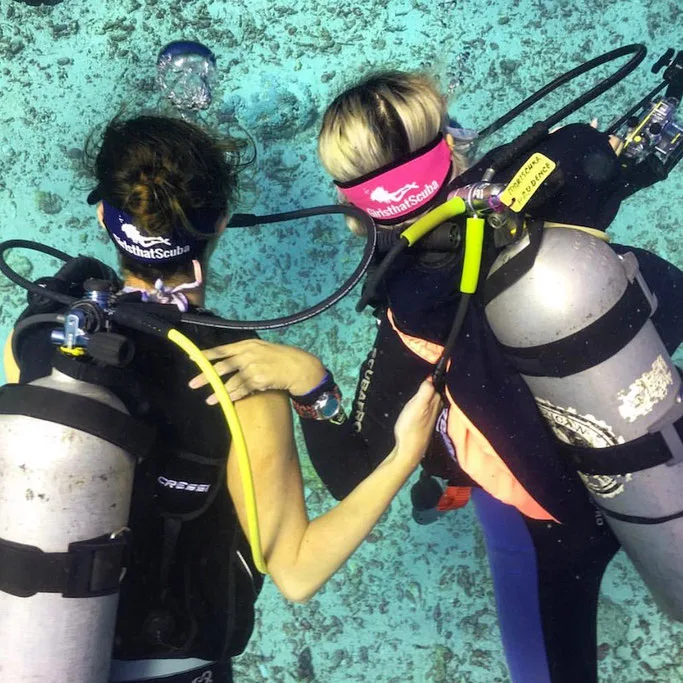
What’s your dive experience?
When pairing you with a new buddy most dive operations will endeavour to join similar experience levels together, but you should still invest some time in getting to know them before you back roll in together. It’s better to approach this as an open conversation as opposed to making them feel as if they’re being interviewed. It’s also a more fun approach; if there’s anything we all love talking about it’s diving, so they’ll likely be more than happy to share their past dive adventures with you!
Whilst asking someone’s certification level may seem like the obvious starting point, it won’t necessarily paint a full picture of their dive experience. An Advanced Open Water diver could be someone who has just completed their course, with only ten dives total in warm water and no current, or could just as easily be somebody with hundreds of dives in varied temperatures and levels of visibility. Instead of just enquiring about their certification level, reach for more open ended questions such as “what’s your dive experience?”, “when was the last time you dived?” and “where else have you been diving?”. These are similar questions to those a Divemaster might ask you when you’re about to dive with them for the first time.
What’s your limit?
It should go without saying that you always follow the depth limit of your own certification level and your experience, but what happens if you’re paired with someone of a different certification level? Remember, you will always dive to the shallower buddy’s limits. This applies not only to depths, but also to comfort level with certain elements of the dive. For example, if the divemaster has briefed the whole group that there will be an optional swim-through, ensure that you’re on the same page about your personal limits. Don’t be afraid to tell your buddy that you’re not comfortable with something; a responsible fellow diver should be respectful of your limits in order to keep you both safe.
If there’s a difference in your experience level, then try to be considerate of one another’s needs. As the more experienced diver you may have the opportunity to share some wisdom, and as the less experienced diver you may learn something new. Many people follow the rule that any diver can cancel any dive, at any time, for any reason, with no judgement from the rest of the group. This is particularly useful if you’re a less experienced diver and worrying that you may be pressured into something you’re not comfortable with.
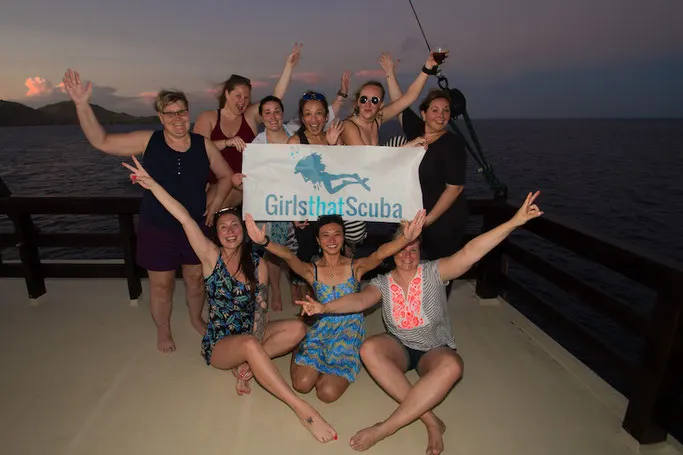
Set the pace and purpose
If your dive will be more independent than simply following a Divemaster and a larger group (as you can sometimes find on liveaboards or large day boats), then check that you and your buddy are on the same page when it comes to the pace of your dive. If you’re someone who likes to meander along and analyse every crevice for nudibranchs, but your buddy prefers a fast paced swim covering ground and gazing out into the blue, you might not be the most compatible pairing.
This can quite often be the case if a photographer, amateur or otherwise, is paired with someone who isn’t carrying a camera, so remember to also discuss what you want to get out of the dive. If you know that your main goal for a dive is to search for creatures to snap, but your buddy is just along for the ride and isn’t interested in cameras, perhaps consider hiring a private guide as opposed to being paired with a buddy who’s there to enjoy their own dive.
Read More: What NOT to do on your first liveaboard
How will you communicate?
You may think that hand signals are pretty universal across the dive world, and although you’re unlikely to find variations on the signal for “okay”, other signals such as signalling remaining air (dependent on whether you’re measuring in bar or PSI) may vary. Ensure that you both listen carefully to the signals during the dive briefing, and then consider reviewing these signals in your buddy pair to check you’re on the same page. You could also consider carrying a slate or wet notes in your BCD pocket as a form of redundancy communication if you find you’re not speaking the same scuba language underwater!
You may also want to establish how to get one other’s attention if necessary. Underwater rattles and tank banging can really divide opinion amongst divers, so check that your buddy is happy for you to get their attention that way. Alternatives include using a torch to pass a beam of light across their field of vision, or a gentle tap on the shoulder or pull of the fin – but only if you both agree it’s something you’re comfortable with.
Find a new buddy ahead of time
Whilst it will still require you to get to know them when you meet in person, there are ways to find a new buddy in your future dive destination before your arrival. One option is our Facebook group Girls that Scuba Together, which allows you to post the place and dates of your upcoming trip to discover if anyone else from our community will be able to dive with you! We also wrote about another great way to find buddies online through SeaCrush here.
Who’s your favourite buddy and what qualities make them so great? Have you ever been paired with an awesome buddy on a one-off dive? Let us know in the comments below, or share your stories with our Facebook group or on Instagram @girlsthatscuba!
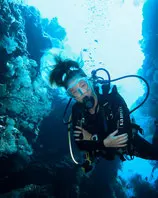
About the author – our GTS blogger Lauren
Lauren originally learned to dive in 2008, and her heart has been in the ocean ever since. In 2018 her sense of adventure and passion for the underwater world led her to Indonesia, where she completed her PADI Divemaster and Instructor qualifications. You can find her on Instagram @laurennn_elizabeth to follow where the currents take her next!

